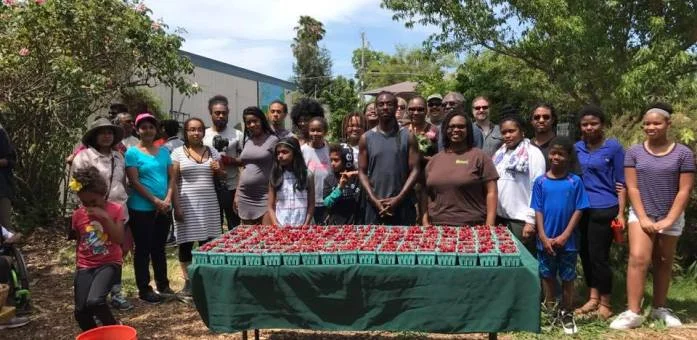Urban Farm Story: Sacramento’s Yisrael Family Urban Farm
Yisrael Family Urban Farm is located on a double lot in the South Oak Park neighborhood of Sacramento, at the home of owners Judith and Chanowk Yisrael. South Oak Park is one of Sacramento's underserved communities; it has been called a “food desert,” with more fast food outlets than places selling healthy food. The half-acre farm currently includes a front-yard food forest with healing and culinary herbs, more than 40 fruit trees, rows of vegetable beds, herbs, a small flock of chickens, worm composting bins, beehives and a high tunnel hoop-house used for giving seedlings an early start in cold winter months. Yisrael Farm also makes space for community gatherings with welcoming tables and a circle of tree stumps and seats around a fire pit on a grassy area. The farm is home to many gardening and cooking workshops and other community gatherings.
Yisrael farm produces healthy food for the Yisrael family and their community. More importantly, Chanowk and Judith help to grow a healthy community by sharing their skills and knowledge, offering classes, workshops and programs for youth, and teaching others how to grow their own food and cook healthy meals. Their mission is to “transform the hood for G.O.O.D.” (G.O.O.D. stands for “Growing our own Destiny") using urban agriculture as a tool for community engagement, empowerment and employment. They demonstrate the benefits of growing your own food and principles of cultivation of the soil which they share with their local community and the world.
Programs include farm tours, volunteer work days, Urban Roots Garden Builds, which organizes neighborhood volunteers to create backyard gardens for Sacramento residents, and Project GOOD (Growing Our Own Destiny), which brings youth together to have fun while learning where food comes from, how it is grown and how to prepare it. In addition, the Yisrael family produces (and teaches others to produce) natural soaps, lip balms, candles, and lotions using herbs and beeswax from the farm.
The Yisraels are also involved in advocacy efforts in support of Sacramento region urban farming policies that encourage and support urban agriculture.
The Yisrael family now raises 45 to 50 percent of their own food, and distribute some of their crops informally in their community. In 2017, they raised about 4000 pounds of food and hosted about 1500 visitors. Yisrael Farm operates an urban farm stand, selling directly from the farm to visitors. Farm stand products are fresh produce, farm-raised eggs, jams produced under a cottage food registration, and soaps and other body care products made using farm products. Marketing the food produced on the farm is not a major part of Yisrael Family Urban Farm's program. The major focus of Yisrael Farm is education. Programs and events and classes are marketed through the website, Facebook, Twitter and through community partners.
Good rich soil grows nutritious crops. Chanowk Yisrael has spent more than ten years building the soil at Yisrael Family Farm, using natural methods including composting, double-digging, cover-cropping and low-till techniques. The farm soil is now distinctively rich and loose and healthy, enabling the growth of abundant healthy food.
Becoming a farmer wasn't easy. Before 2007, Chanowk Yisrael was an information technology professional with no knowledge of agriculture. His first attempt at growing food, in 2007, was planting about 30 square feet with food crops, in July, in Sacramento. Everything died, as July is much too hot in Sacramento for starting a garden. Since then he has learned from experienced Northern California farmers how to grow food, and has taken to heart the advice of one of his mentors: "Forget about the plants; take care of the soil."
Other challenges involved obtaining the right to sell produce grown on the farm, which was illegal until 2015. The Yisraels were involved in the community advocacy effort, led by the Sacramento Urban Agriculture Coalition, to legalize urban farm stands in both the city and the county of Sacramento.
Learn More
Address: 4507 Roosevelt Avenue, Sacramento, CA 95820
Website: http://www.yisraelfamilyfarm.net/
Social Media links: https://www.facebook.com/yisraelfarm/
Videos:
http://lecture.ucanr.edu/Mediasite/Play/9113f0a530c14549ab1410d614c5f0131d
http://lecture.ucanr.edu/Mediasite/Play/f9dfb812288e42ba90bb30d6de7265051d
Contact:
888-487-9494 option 2, sales@yisraelfamilyfarm.net
Tags: Sacramento (1), Urban Agriculture (27), Urban Agriculture/Local and Regional Food Systems (3), Urban Farm (7), Urban Farmers









